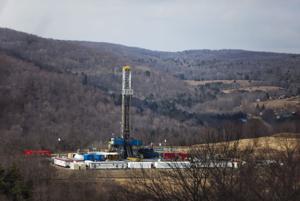
By AD CRABLE | Staff Writer
As surging natural gas drilling makes Pennsylvania second in the nation in production, a second neighboring state has banned fracking wells.
Last Friday, a moratorium on fracking became law in Maryland. A two-year ban on natural gas extraction by fracking had passed overwhelmingly in both houses of the state General Assembly earlier in the year. New Gov. Larry Hogan, a Republican, did not veto the bill, allowing it to become law.
Maryland officials and residents have expressed concerns about fracking’s impact on the environment and public health.
Last December, New York state’s newly elected Democratic Governor Andrew Cuomo declared a statewide ban on fracking. The declaration came after years of debate in the Empire State on the safety of the drilling method.
Cuomo’s announcement came after the release of a long-awaited state Department of Environmental Conservation review on fracking's potential effects on health and the environment that was six years in the making. A study by state health officials found “significant uncertainties” about fracking.
Vermont and Massachusetts also have banned fracking, but they do not have any Marcellus Shale deposits of gas and the moves are largely symbolic.
Hydraulic fracturing is a drilling technique used to reach deeply buried natural gas deposits by injecting a high-pressure mix of water, sand and chemicals underground, fracturing bedrock and releasing the gas.
As two Pennsylvania border states refuse to allow fracking to start, new Pennsylvania Gov. Tom Wolf has taken several actions recently that seem to encourage continued fracking, despite his campaign pledge to lower a heavy severance tax on natural gas production.
Last week, Wolf announced he is forming a task force to get communities, the gas industry and state agencies to cooperate in siting up to 30,000 miles of gas pipelines needed to be built in the next decade.
A proposed natural gas pipeline through 35 miles of Lancaster County has been controversial. Many feel Lancaster County will be targeted for more pipelines as getting gas to market catches up with heavy production at well pads.
“We need to work with the industry to make sure that the positive economic benefits of Pennsylvania’s natural resources can more quickly be realized in a responsible way,” Wolf said in forming the task force.
‘This task force is part of our commitment to seeing the natural gas industry succeed,” he said.
Wolf has said that natural gas drilling must be done safely without harming people or the environment. He has reinstated a moratorium on additional fracking on state forest lands and state parks
Meanwhile, the recent bans in New York and Maryland are not expected to have much impact on Pennsylvania’s active drilling. Deep gas deposits in both Maryland and New York are considered inferior to gas found in Pennsylvania.

No comments:
Post a Comment
Note: Only a member of this blog may post a comment.